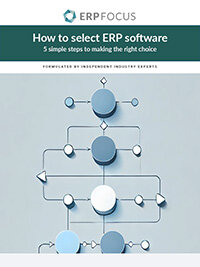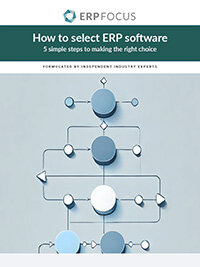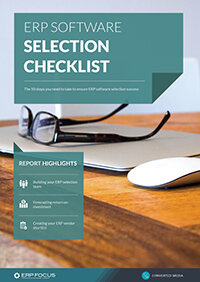How to choose an ERP consultant
Selecting and implementing an ERP system is a rare event. Few organizations will take on this challenge more than once in a decade. Many people will never get an opportunity through their entire career. Getting it right can set up a business for years to come while getting it wrong can lead to the end. Most businesses and organizations will use consultants to supplement the expertise they already have. ERP consultants specialize in selecting and implementing ERP systems for their clients. That is their job and most are good at those jobs.
Here we will consider some of the steps to take when choosing an ERP consultant.
Consultants types
Now is the time to begin talking with possible ERP consultants. There are individuals in many disciplines who specialize in ERP implementation projects. There are firms with ERP specializations who employ or use vetted contractors to perform the tasks necessary. There are local and international consulting businesses that have the capabilities needed for ERP selection and implementation and can employ another department to suggest marketing improvements. You might decide to employ someone to help select your ERP and another firm to help with implementation. There are many possibilities and most can lead to a successful outcome.
All of these people and firms have ERP skills and experience you could never accumulate working in your own business. However, for selection, you will want to make a choice that has a background in your marketplace. In addition, for implementation, you want help experienced with the particular ERP you chose.
There are many different skills needed. If you decide to work with an individual contractor, you likely will need several different contractors during the project. Your choice might have a needed network of other contractors and, with luck; they all will have time for your project. If you choose to work with a larger firm, they already have the network of unique skills available.
Requirements
Like any ERP consideration, defining your requirements is first. Ask each functional group to list specific and measurable requirements that ERP will benefit those departments and the entire enterprise. Hold meetings and share these lists. At the end, you should have a common agreement on certain requirements that the whole organization agrees upon and the list is prioritized with must-have items and nice-to-have items both shown. These requirements for your ERP are yours. Any consultants you bring on are there to assist you to select the right ERP and guide you toward meeting those requirements by properly configuring that ERP
Don't miss any feature requirements for your ERP project using our free ERP features guide
Resources and gap analyses
Few organizations have all the needed resources to evaluate and implement ERP – the jobs are too many and the experience is unlikely to be on hand. Needed resources include those needed to manage facets of ERP as well as those to continue the work people assigned to the project did on their day jobs before the project. In many cases, those resource needs will be limited to the ERP project and will no longer be needed in the future so consultants who can help for a limited time make sense. More than time, there will be skills needed for a limited time such as data conversion. Skills that are specific, important now, and unneeded later.
Company culture
Before starting to evaluate who will fill the needed roles, be sure to understand your culture. Is yours an organization that looks for consensus before any decision? Are successful choices made after detailed analysis or do only the executive staff make them with little conversation? There is no perfect culture, but the people in your business are there because they fit your culture. Those short-term people you bring on for the ERP project must fit too.
Project manager
This position is at the heart of any successful ERP project. Some will decide to use a person from their consultants because they have the background already and know the consultant personnel. Others will use a person from their own business. This can be an excellent way to develop a star performer with a major project that is critical to all departments. Keeping the project manager within the business also helps remind all that this is a project for the business and not something installed from outside that can be ignored.
Rank your candidates
Develop a rating system of your own to compare all the consultants and contractors you ask to present bids. Agree within your team what factors are most important and rank the candidates on your scale to help determine which one best fits your needs and culture. Reach an agreement and get to work.
Factors to consider might include these:
- Length of time in business
- Financial strength of consultant business
- Recommendations from credible sources
- Specialization in your chosen ERP system
- Specialization in your business niche
- Expertise of specific consultant personnel in specific areas such as training, testing, etc.
- “Fit” with your culture. Can you work with this consultant for an extended time?
- Evaluate consultant personnel too. Who will you actually work with?
Ask your team members to turn in their own rankings. Then add up the totals and take an average for each point. Look carefully at outlier ranks, if four team members gave a score of one and one gave it a five, the average is two but it probably means that consultant is not a fit.
Specific areas your consultant can provide expertise
Ask for guidance setting up the project management structure. They have done it before and should help with measurements and communication methods
Your IT staff will need help with data conversion. While they are familiar with the legacy data structure, they will need to learn the new system. Your consultant should know the correct sequence to load data into various tables to pass all the system validations.
Download our free ERP implementation guide (with implementation planning sheet)
Your consultants should suggest automated testing tools they know. They should also provide guidance in setting up test processes and, at first, they will know the cause of test errors until your team becomes more familiar with the new ERP.
Your consultants might have a training expert who can help develop the training materials you will use. That expert can also prepare your super users who are already good at their own jobs but might not yet be expert trainers. Those super users will be the core trainers after the consultants are gone and new users will be hired in the future.
On go-live day, your ideal will be to manage the immediate conversion and first actual use of your new ERP with your own team. But you know Murphy will be laying in wait so you want members of your consultant group ready and waiting to quickly fix whatever issues arise and provide last-minute hand holding for some user who “forgot” their training in a panic.
Ongoing evaluation
You made the final choice and your project is underway. However, the evaluation must go on. Ask your team members to keep a record of their experiences with your consulting team. Were they on time? How well do they match your culture? Have they provided the advice and support you expect? You probably will not fire the consulting parent group but individual members could need a course correction. Do not let problems fester, your project will move more smoothly. Your consultants want an overall good impression and to complete their mission to your satisfaction.
You will need to supplement your team with consultants for a project of this magnitude. Be sure they understand their role is to protect your interests. Find help with the right expertise and proven methodology. Your ERP selection and implementation can be done on time and within budget.
Free white paper

How to Select ERP
Learn to select your ERP in 5 easy steps by following our expert's advice

Featured white papers
-

ERP Software Pricing Guide
Get the latest pricing information on over 80 popular ERP systems, and learn how to budget for your ERP project in our free guide
Download -

60-Step ERP Selection Checklist
Get the comprehensive checklist for your ERP selection project
Download -

ERP Demo Guide & Scorecard
Master your ERP demo with 5 easy steps using our free guide (includes demo scorecard)
Download
Related articles
-

The best ERP systems for process manufacturing
Consider these ERP systems when selecting your next process manufacturing ERP
-

Secret KPI: Why Your ERP Implementation Team Matters More Than Software
Learn how Godlan ensures successful ERP implementation for manufacturers with proven strategies &...
-

5 ERP pricing definitions you need to understand
Have you mastered the ERP pricing lexicon yet? Getting to grips with these five definitions is a ...

